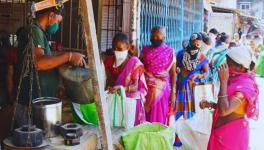COVID-19 in Rural India-XIII: Lack of Labour, a Key Anxiety for Farmers in Theri Village
Representational Image.
This is the 13th report in a series that provides glimpses into the impact of COVID-19-related policies on life in rural India. The series, commissioned by the Society for Social and Economic Research, comprises reports by various scholars who have been conducting village studies in different parts of India. The reports have been prepared on the basis of telephonic interviews with key informants in their study villages. This report describes the impact of the COVID-19 pandemic and the nationwide lockdown onthe economy, lives and livelihoods of inhabitants of Theri village in Punjab.
Theri village is in Sri Muktsar Sahib district of Punjab. The village is 34 km from the district headquarters (the city of Sri Muktsar Sahib), and 255 km from the state capital, Chandigarh.
The village has 734 households and a total population of about 4,000, according to village panchayat head. Like many other villages in India, the settlement in Theri is also organised by castes. Jat Sikh households live in three wards of the village, while Scheduled Caste and Scheduled Tribe households live in the remaining six wards.
According to the panchayat head, the caste, clan and tribal groups in the village include jat, chamar, bazigar, mazhabi, sunar, and tarkhan. The jat Sikhs are the main landowning group and make up about 30% of the population. Mazhabi Sikhs, mostly landless, make up about 20% of the population. Bazigars, also mostly landless, account for about 13%. The village also has several individuals engaged in non-farm occupations, including carpenters, repair workshop workers, masons, construction workers (such as JCB operators) and those who own or work in spare parts shops.
When the interviews were conducted (March 1 and April 3), the harvesting of wheat had not yet begun. Farmers here harvest wheat using combine harvesters, but they also hire workers to perform operations, such as loading and unloading. Therefore, an influx of migrant workers seeking agricultural work is usual at this time of year.
However, the lockdown has prevented migrant workers from coming to the village this year. One respondent, who is a farmer, reported that most migrant workers who were in the village had left for their home states. The lack of available labour was a source of anxiety for him. He also said there was no clarity about when the sale of wheat would take place or how procurement would occur during the lockdown.
The village is 8 km away from two towns, Malout and Gidderbah. Farmers typically sell their produce in the grain markets of the two towns. Since the lockdown restricted movement, this farmer was worried about how to store his produce, since he lacked the space to do so.
Agricultural markets are also facing a shortage of labour, since they also typically rely on migrant labour.
Many of those involved in non-agricultural work have lost their sources of income. One of the respondents, a carpenter, reported that the lockdown had negatively impacted his ability to earn to support his household. His family includes his wife, four children and his ailing mother.
Before the lockdown, he found work within the village or in the towns nearby. He also said that many medications were out of stock at the two pharmacies in the village. When asked about this, the owner of one of the pharmacies said he had not received his usual stock due to disruption in the supply chain. Most poor households in the village do not keep stocks of essential medicines due to a lack of cash and buy small quantities ,as and when needed. A 50-year-old female worker, who is a domestic worker employed by two households in the village, would normally have earned Rs 1,700 per month, said she had lost this income owing to the lockdown.
Two respondents, who own a shop to repair agricultural machinery in this village, said they usually undertook a lot of work in March, but had to shut shop during the first few days after the lockdown was announced. Although they have been allowed to reopen since the second week of the lockdown, they continue to face problems, such as not being able to acquire the tools and spare parts they need to repair machines, since these are usually purchased from nearby towns and cities.
Operators of earth mover machinery, too, have been affected by the shutting down of the nearby biomass thermal plants as well as the stoppage of all other construction work. Bazigar households in the village own 50-60 tractors and use this to transport goods, such as agricultural produce, across parts of Punjab and in some parts of Haryana, Himachal Pradesh and Rajasthan. They have been badly affected as inter-state transport of goods has been stopped.
Theri village has one private bank (AXIS Bank) but there is no ATM. The manager of the bank reported that, under the old-age pension scheme, the beneficiaries used to get Rs 500 per month, but for the month of March, they received Rs 750, as the state government has given them an increment of Rs 250 to provide some relief during the lockdown.
According to the head, the village panchayat has spent Rs.50,000 so far to provide essential food supplies (including salt, turmeric, sugar, tea, rice and ghee) to about 161 poor families. The panchayat head noted that there was no confirmation yet of what the state government’s relief package or measures would be.
The rural economy, which had already been facing a number of challenges, has been badly affected by the COVID-19 pandemic. The most affected in Therivillage are casual workers, migrant workers and other daily wage earners, many of whom have been unable to access even essential supplies. However, local government and community groups are playing a very important role in mitigating the problems thrown up by the pandemic and the policy response to it.
[Telephonic interviews were conducted, first with the head of the village panchayat and then with other informants, to gather information; the respondents include a farmer, a mason, an operator of earthmover machinery, two owners of repair shops, one female worker, a bank manager and three individuals from the Bazigar tribe. The interviews were conducted on March 31 and April 3, 2020. ]
The writer is a Research Scholar in Punjabi University, Patiala.
Get the latest reports & analysis with people's perspective on Protests, movements & deep analytical videos, discussions of the current affairs in your Telegram app. Subscribe to NewsClick's Telegram channel & get Real-Time updates on stories, as they get published on our website.
























